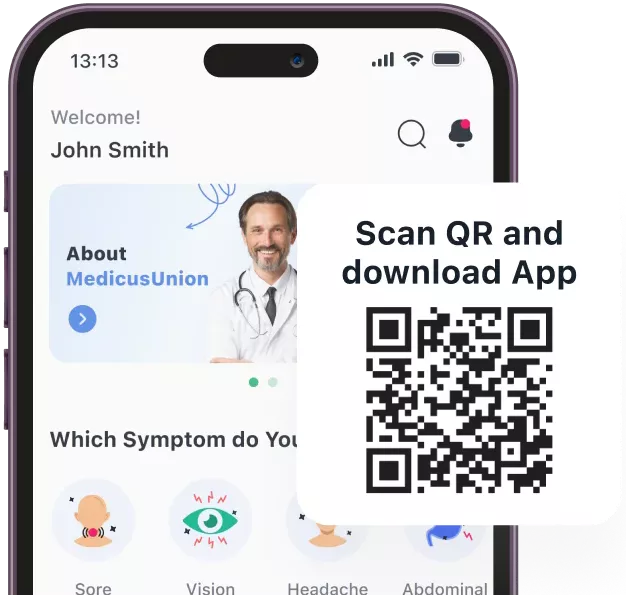English
Русский
Deutsch

Genetic Disorders in Childhood: Early Diagnosis and Intervention
MedicusUnion Team
November 16, 2023
5 min. read
Explore the world of genetic disorders and their causes in our latest blog article. Learn about chromosomal, complex, and single-gene disorders, and understand how mutations impact genes and DNA. Discover the importance of preconception screenings, early detection, and available treatments.
Genetic disorders occur when a mutation (a harmful change to a gene, also known as a pathogenic variant) affects your genes or when you have the wrong amount of genetic material. Genes are made of DNA (deoxyribonucleic acid), which contain instructions for cell functioning and the characteristics that make you unique. You receive half your genes from each biological parent and may inherit a gene mutation from one parent or both. Sometimes genes change due to issues within the DNA (mutations). This can raise your risk of having a genetic disorder. Some cause symptoms at birth, while others develop over time.
The causes of genetic disorders
Genetic disorders can be:
- Chromosomal: This type affects the structures that hold your genes/DNA within each cell (chromosomes). With these conditions, people are missing or have duplicated chromosome material.
- Complex (multifactorial): These disorders stem from a combination of gene mutations and other factors. They include chemical exposure, diet, certain medications and tobacco or alcohol use.
- Single-gene (monogenic): This group of conditions occurs from a single gene mutation
To understand genetic disorder causes, it’s helpful to learn more about how your genes and DNA work. Most of the DNA in your genes instructs the body to make proteins. These proteins start complex cell interactions that help you stay healthy.
When a mutation occurs, it affects the gene's protein-making instructions. There could be missing proteins or the ones you have do not function properly. Environmental factors (also called mutagens) that could lead to a genetic mutation include:
- Chemical exposure
- Radiation exposure
- Smoking
- UV exposure from the sun
Screening
Healthcare before and around the time of getting pregnant (before and during pregnancy) involves taking care of your reproductive health and checking for genetic issues. There are three key times for these checks:
- Before Getting Pregnant: It's helpful to find out if you or your partner might have health problems that could affect your future baby. This involves looking into your family's health history and checking if you carry any genetic conditions. It's especially important in places where people in the family might marry their relatives.
- Around the Time of Conception: Some things about the mother can increase the chances of problems, and it's important to check for them. This includes checking for age-related risks and looking into habits like smoking and drinking. Ultrasound scans can check for issues like Down syndrome and major physical problems in the baby during the early stages of pregnancy.Blood tests can check for markers that show the risk of genetic problems or birth defects. Special tests like chorionic villus sampling and amniocentesis can diagnose serious issues in high-risk pregnancies.
- Newborn Screening: After the baby is born, it's crucial to check for any health problems early to save lives and prevent suffering. For example, hearing problems can be fixed if found early, giving the baby a better chance to learn language and communicate. Detecting cataracts early can also save a baby's sight. Newborns are tested for certain disorders that might not show immediate symptoms, and the tests differ by country based on how common these issues are and how much they cost. Even in countries with fewer resources, more and more newborns are getting these important checks.
The goal of these screenings is to keep both the mother and the baby as healthy as possible by catching potential problems early and providing appropriate care.
Treatment and Care
Congenital disorders are medical conditions that are present from birth. Treating these conditions often involves medical or surgical interventions. However, the availability of such treatment can vary widely depending on the country and the level of the healthcare system in place. Notably, even in low- and middle-income settings, there is an increasing capacity to provide complex care for congenital disorders.
Surgical interventions, when coupled with proper post-operative care, can significantly mitigate the potential lethality or morbidity associated with structural congenital disorders. For example, congenital heart defects can be life-threatening, but well-executed surgeries followed by diligent post-operative care can greatly improve outcomes. Similarly, conditions like congenital talipes (clubfoot) or cleft lip/palate can be functionally and aesthetically corrected through surgery, significantly enhancing the individual's quality of life.
In some cases, medical treatment can enhance the quality of life for individuals with congenital disorders. For instance, congenital hypothyroidism, if identified early and managed with medication, can ensure proper physical and mental development, allowing the individual to lead a healthy life. Failure to diagnose or lack of access to such straightforward treatments can lead to severe intellectual disability.
Children with some types of congenital disorders may require long term support including physical therapy, speech therapy, occupational therapy and support from families and community.
Conclusion
Early diagnosis and intervention are critical in managing genetic disorders in childhood. Telemedicine plays a pivotal role in improving access to genetic expertise and services, making it easier for families to seek help and guidance.
MedicusUnion is dedicated to helping families navigate the complexities of genetic disorders by offering telemedicine services that enhance early diagnosis and intervention, ultimately improving the quality of life for children affected by these conditions.
We believe that with the right support and timely care, every child has the potential to thrive, regardless of their genetic challenges.

Get the MedicusUnion App!
- Certified Doctors
- Video consultation with a doctor
- Simultaneous interpreter during consultations